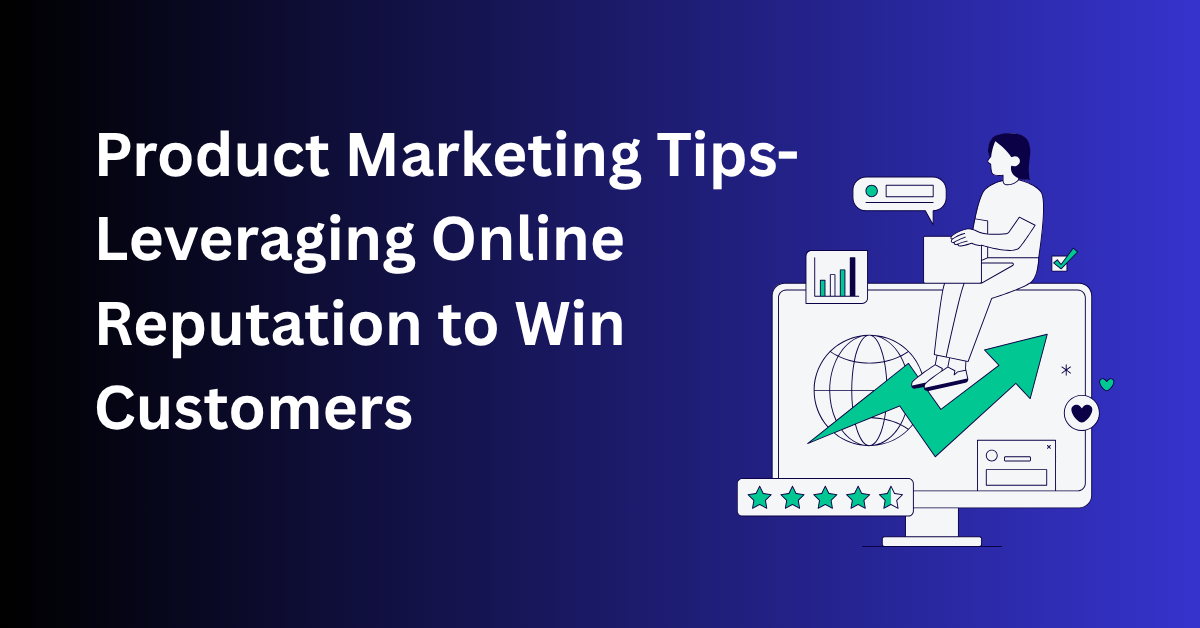Your reputation isn’t just what people say about you when you’re not in the room anymore. Online, it’s what potential customers see in reviews, ratings, and testimonials before they even meet you. Any serious product marketer understands the pivotal role online reputation plays in shaping consumer trust and purchase decisions. With over 90% of customers reading reviews before making a purchase, your online reputation could be the key to winning (or losing) their loyalty.
This blog is your guide to making your brand’s online reputation a powerful product marketing tool. You’ll learn why an excellent online reputation matters, actionable strategies to leverage it, and practical tips to combat negative feedback effectively.
Why Your Online Reputation Matters in Product Marketing
Your online reputation can be a silent salesperson, working tirelessly in the background to influence how people perceive your brand. Here’s why that perception is critical in product marketing:
Builds Trust and Credibility
Trust takes years to build and seconds to shatter. Your online reputation often forms the largest piece of the trust-building puzzle. When people see glowing reviews, authentic testimonials, or high user ratings, they’re more likely to feel comfortable choosing your product over competitors.
Acts as Social Proof
According to Nielsen, 92% of consumers trust recommendations from friends and family, and 70% trust online reviews from strangers. Social proof, like customer reviews and case studies, signals to potential customers that others have had positive experiences with your product.
Influences Purchase Decisions
A single negative review can deter 40% of potential customers, as suggested by BrightLocal’s research. Conversely, hundreds of positive reviews can reassure customers that your brand delivers on its promises. How your product is rated and reviewed has the power to sway decisions before a prospect even visits your website.
6 Actionable Tips to Leverage Online Reputation
Now that we’ve established its importance, here’s how you can put your online reputation to work as a key player in your product marketing strategy:
1. Claim Your Online Real Estate
Whether it’s Google My Business, Yelp, Trustpilot, or niche review platforms like Capterra (for SaaS businesses), make sure you’ve claimed your profile wherever potential customers look. Complete these profiles with updated information, compelling photos, and a description of your product that highlights its unique value.
Pro Tip
Always include direct links to these review platforms in your email signature, newsletters, and social media campaigns to encourage more reviews.
2. Proactively Encourage Reviews
The best time to ask for a review is when your customer is most satisfied. Post-purchase or post-delivery follow-ups work wonders. Be polite but direct. Send an email with a request like, “Thanks for purchasing [Product]! We’d love to hear your feedback. Your input helps us improve and also lets others know why they should choose us.”
Best Practices for Review Requests
- Keep it short and simple: No one wants to read long emails.
- Provide a direct link to where they can leave a review: Don’t make customers search for it.
- Time your ask wisely: Trigger automatic follow-ups a few days (or weeks) after their experience.
Automation tools like Mailchimp or Klaviyo can streamline your follow-up process.
3. Highlight Positive Feedback in Marketing Materials
Don’t bury great testimonials in the depths of your website. Display them proudly on your homepage, marketing landing pages, and social media channels. Incorporate them into product videos, blog posts, and email campaigns.
Quick Tips
- Create a rotating carousel of user reviews on your homepage.
- Design branded quote images for Instagram and Facebook featuring customer testimonials.
- Use snippets of reviews in retargeting ads to draw cold leads further into your funnel.
4. Respond to Reviews Strategically
When managed correctly, both positive and negative reviews can work in your favor. Thank customers who leave glowing reviews and engage with their feedback to build stronger connections.
For negative reviews, avoid being defensive. Instead, respond professionally, addressing the customer’s concerns and offering solutions when possible. Public resolutions demonstrate your dedication to customer satisfaction, which can win over skeptical audiences.
Response Formula for Negative Feedback
- Apologize: Acknowledge their experience without placing blame.
- Address: Offer an explanation (if applicable) without making excuses.
- Action: Outline how you’re solving the problem or improving moving forward.
5. Monitor Your Reputation Consistently
Set up alerts using tools like Google Alerts, Mention, or Brand24 to keep track of what’s being said about your product online. Consistently monitoring your reputation helps you address issues quickly and maintain a positive brand perception.
What to Monitor
- Brand name mentions (including misspellings).
- Your competitors’ reviews (to identify gaps in your marketing strategy).
- Keywords tied to user complaints or praises are tied to your product.
6. Collaborate with Influencers and Advocates
Identify influencers or brand advocates who genuinely like and use your product. When they share authentic testimonials and reviews, their followers often see it as more trustworthy than traditional advertising.
Mistakes to Avoid
Even the best strategies can be sabotaged by a few all-too-common mistakes. Watch out for these pitfalls when leveraging your online reputation for product marketing:
- Faking reviews: This will backfire if customers sense inauthenticity.
- Neglecting review platforms: Don’t create profiles and leave them to gather digital dust. Update and engage regularly.
- Over-promising in responses: Be realistic about what you offer and what resolutions you commit to.
Elevate Your Brand’s Online Reputation Today
A stellar online reputation doesn’t happen overnight, but the results are well worth the effort. It builds trust, drives sales, and keeps your product top-of-mind in a competitive market. By consistently engaging with customer reviews, showcasing positive feedback, and addressing concerns professionally, you’ll master one of the most cost-effective ways to win customers.
If you’re ready to take your product marketing efforts to the next level, start applying these tips today. For more insights, strategies, and tools to grow your business, stay tuned to our blog.






